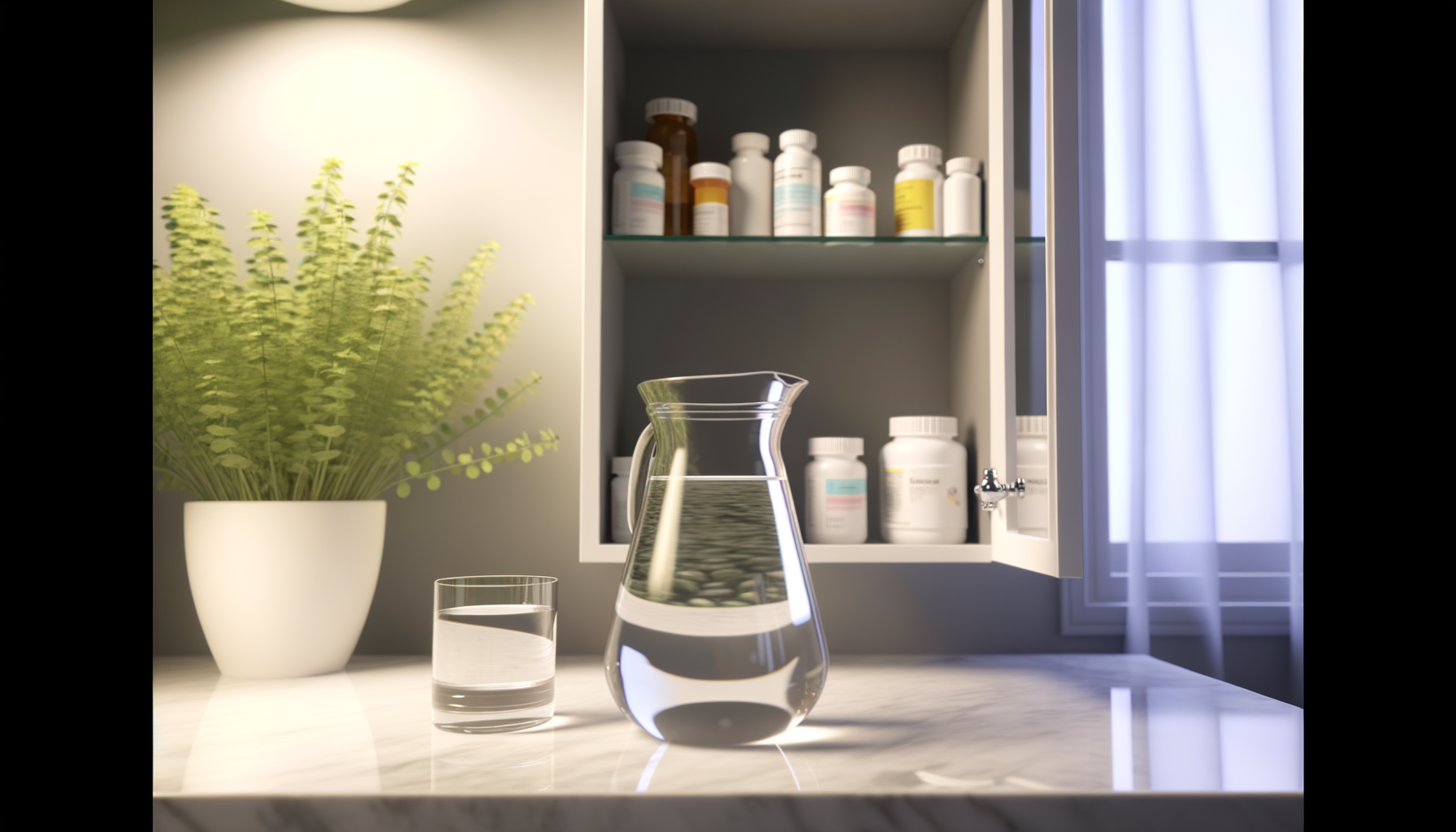The Role of Hormones in Vaginal Health
Vaginal health is intricately tied to the delicate balance of hormones within the female body, particularly estrogen and testosterone. These hormones are responsible for maintaining the blood flow to the vagina, which in turn affects the production of the thin layer of lubricating fluid that protects vaginal tissues. Even minor fluctuations in hormone levels can lead to significant changes in vaginal lubrication and overall health. For instance, hormonal contraceptives, such as birth control pills and shots, can alter the estrogen/progesterone ratio and increase sex hormone binding globulin (SHBG), potentially leading to vaginal dryness.
Symptoms and Impact on Quality of Life
The symptoms of vaginal dryness can be more than just uncomfortable; they can have a profound impact on a woman’s quality of life. Common symptoms include vaginal itching, irritation, burning, and pain during intercourse, known as dyspareunia. These symptoms can lead to a decrease in sexual desire and activity, contributing to emotional distress and strain on intimate relationships. Additionally, vaginal dryness can be associated with other symptoms such as increased urinary frequency or recurrent urinary tract infections, particularly during menopause.
Common Misconceptions and Overlooked Causes
While menopause is a well-known cause of vaginal dryness, there are several misconceptions and overlooked factors that can contribute to this condition. For example, vaginal dryness is not exclusive to menopausal women; it can occur after childbirth, during breastfeeding, or as a side effect of cancer treatments. Non-hormonal factors such as the use of certain cold and allergy medications, antidepressants, and hygiene products can also lead to dryness. Moreover, lifestyle choices like smoking and alcohol consumption can exacerbate the issue. It is essential to recognize these potential causes to address the root of the problem effectively.
Medications That May Cause Vaginal Dryness
Hormonal Birth Control: Pills and Shots
Many women rely on hormonal birth control for family planning, but these medications can have unintended side effects. Birth control pills can lead to hormonal fluctuations and an imbalance in estrogen/progesterone ratios, potentially resulting in vaginal dryness. This is due to an increase in sex hormone binding globulin (SHBG), which binds excess hormones and removes them from circulation. Similarly, birth control shots like Depo-Provera can suppress female hormones to levels akin to menopause, reducing vaginal lubrication.
Sedatives and Their Side Effects
Sedatives, including those used for insomnia and anxiety such as Halcion and Xanax, can also contribute to vaginal dryness. These medications, along with others used to prevent seizures, can lead to sexual dysfunction, including decreased lubrication and sexual desire.
Cold and Allergy Medications
Both prescription and over-the-counter cold and allergy medications can be culprits of vaginal dryness. Antihistamines and decongestants work by narrowing blood vessels and reducing mucus production, which can also affect the vaginal membranes. While the effect is not permanent, it can cause discomfort and issues during sexual activity.
Antibiotics and Vaginal Flora
Antibiotics are known for altering the balance of bacteria in the vagina, which can lead to yeast infections and subsequent vaginal dryness. Although antibiotics do not directly reduce vaginal secretions, their impact on vaginal flora can create conditions that lead to dryness and discomfort.
Blood Pressure and Heart Medications
Medications for heart and blood pressure, such as calcium channel blockers and beta-blockers, have been associated with vaginal dryness in some individuals. These drugs affect blood flow and may reduce the amount of oxygen and nutrients reaching the sexual organs, leading to decreased lubrication.
Estrogen Modulators in Cancer Treatment
Estrogen modulators, such as Tamoxifen and Evista, used in cancer treatments, block estrogen receptors in vaginal tissue, which can result in lower levels of lubrication. Additionally, chemotherapy and radiation may decrease estrogen production directly, leading to vaginal dryness.
It’s important to note that while these medications can cause vaginal dryness, they are often necessary for treating other health conditions. If you experience vaginal dryness, consult with your healthcare provider for potential treatments such as vaginal moisturizers, lubricants, or changes in medication. Never stop taking prescribed medications without first discussing it with your healthcare provider.

Other Factors Contributing to Vaginal Dryness
Medical Conditions and Autoimmune Disorders
Vaginal dryness is not always a standalone issue; it can be a symptom of underlying medical conditions. For instance, autoimmune disorders like Sjögren’s syndrome can lead to dryness not only in the vagina but also in other mucous membranes of the body. This condition affects the glands that produce moisture, leading to dry eyes and mouth, as well as vaginal dryness. Other medical conditions that can contribute to vaginal dryness include diabetes, which can affect blood flow and nerve function, and thyroid disorders, which can disrupt hormone levels.
Lifestyle and Environmental Factors
Lifestyle choices and environmental factors can also play a significant role in vaginal health. Smoking can impair blood flow to vaginal tissues, leading to dryness, while alcohol consumption can dehydrate the body and reduce natural lubrication. Stress is another critical factor; it can interfere with sexual arousal and lead to decreased vaginal secretions. Additionally, exposure to chemicals and allergens can cause inflammation and dryness. It’s important to consider these factors and make lifestyle adjustments where possible to alleviate symptoms.
Hygiene Products and Practices
The products used for personal hygiene can have a significant impact on vaginal moisture levels. Fragranced soaps, washes, and detergents can irritate the delicate skin of the vulva and vagina, leading to dryness and discomfort. Similarly, practices such as douching can disrupt the natural balance of bacteria and pH levels in the vagina, causing dryness and increasing the risk of infections. It is recommended to use unscented, gentle products and to avoid unnecessary practices like douching to maintain optimal vaginal health.
In conclusion, while medications are a common cause of vaginal dryness, it’s essential to consider the broader picture, including medical conditions, lifestyle factors, and hygiene practices. Addressing these underlying factors can help manage symptoms and improve overall vaginal health.
Consulting Healthcare Providers
When to Talk to Your Gynecologist
Vaginal dryness is a common issue that can significantly affect a woman’s quality of life, yet it is often a topic that many hesitate to discuss with their healthcare providers. It is essential to understand that gynecologists are specialists in female reproductive health, and discussing symptoms like vaginal dryness is a crucial part of their job. You should consider scheduling an appointment with your gynecologist if you experience persistent dryness, discomfort during intercourse, or any changes in vaginal health. Additionally, if you notice symptoms such as itching, burning, or unusual discharge, it’s important to seek medical advice as these could be signs of an infection or other health conditions.
Sexual discomfort should not be overlooked, as it can be indicative of underlying issues. If you’re experiencing pain during sex, bleeding after intercourse, or if lubricants do not alleviate dryness, these are all valid reasons to consult your gynecologist. Moreover, if you have concerns about how medications, including hormonal birth control or other prescriptions, may be affecting your vaginal health, a gynecologist can provide guidance and alternative treatment options.
Treatment Options and Personalized Care
Once you’ve initiated the conversation with your gynecologist about vaginal dryness, they can help you explore a range of treatment options. The choice of treatment is highly personalized and will depend on the underlying cause of dryness, your age, medical history, and preferences. Over-the-counter lubricants and vaginal moisturizers are often the first line of treatment for immediate relief. For those whose dryness is due to hormonal changes, such as menopause, local or systemic estrogen therapy may be recommended.
In cases where medications are the culprit, your healthcare provider may adjust your current prescriptions or suggest alternatives that do not have vaginal dryness as a side effect. For women who prefer to avoid hormonal treatments or for whom they are contraindicated, non-estrogenic options like ospemifene may be an option. Additionally, your gynecologist may recommend lifestyle changes, such as increasing foreplay before intercourse to enhance natural lubrication or dietary adjustments to include foods rich in phytoestrogens.
It’s important to have an open and honest dialogue with your gynecologist about your symptoms, concerns, and treatment preferences. They can provide personalized care that takes into account all aspects of your health and well-being. Remember, vaginal dryness is a common issue, and effective treatments are available. You don’t have to suffer in silence—help is available, and it often starts with a conversation in your gynecologist’s office.

Feeling You Have a Right to Safe Beauty & Fem Care?
If so, it may be time for a change. It starts with knowledge. We have a few suggestions in our new guides.
Managing Symptoms of Vaginal Dryness
Over-the-Counter Solutions and Moisturizers
For many individuals dealing with vaginal dryness, over-the-counter (OTC) solutions and moisturizers can provide significant relief. These products are designed to enhance moisture and improve the elasticity of vaginal tissues. Unlike lubricants, which are used primarily during sexual activity, moisturizers are intended for regular use, with applications recommended 3 to 5 times a week to maintain vaginal health. Popular OTC moisturizers include Hyalo GYN®, Revaree®, Replens™, and Good Clean Love BioNourish®. It’s important to avoid products like petroleum jelly, which can irritate the vagina and increase the risk of infection.
Hormonal Treatments and Non-Estrogen Products
When OTC options are insufficient, hormonal treatments may be considered. These include topical vaginal estrogen in the form of creams, vaginal tablets, or rings, which address vaginal atrophy symptoms without significantly raising blood estrogen levels. For those who cannot use estrogen therapy, non-estrogen options like Osphena® (ospemifene) are available. This medication offers benefits similar to estrogen but does not contain any hormones. It’s crucial to discuss potential side effects, such as an increased risk of blood clots, with a healthcare provider.
Home Remedies and Lifestyle Adjustments
Simple home remedies and lifestyle adjustments can also alleviate symptoms of vaginal dryness. Natural oils like coconut or olive oil can be used as lubricants. It’s advisable to use lubricants during sexual intercourse to minimize discomfort. Additionally, avoiding products that may irritate the vagina, such as scented pads or douches, can prevent further dryness. Staying well-hydrated by drinking plenty of water and managing stress levels can also contribute to improving vaginal health.
Dietary Considerations and Natural Supplements
Lastly, dietary considerations and natural supplements may play a role in managing vaginal dryness. Foods rich in isoflavones, like soybeans, can mimic the effects of estrogen and potentially improve symptoms. Supplements containing vitamin E or natural oils can be used as topical moisturizers. However, it’s essential to consult with a healthcare provider before starting any new supplements, as they can interact with medications and may not be suitable for everyone.
In conclusion, managing vaginal dryness involves a multifaceted approach that includes OTC products, possible hormonal treatments, home remedies, and dietary changes. It’s important to address the underlying causes and work with a healthcare provider to develop a personalized care plan.
By the way, something for you, a little gift!!!
I am just in the middle of publishing my book. It’s about How women can balance their hormones. One part is about food and diet, of course.
Follow this link and enter your email.
I will send you this part of the book for free once the book is published. It has many concrete, practical tips and recipes and will help you feel better during menopause or times of Big hormonal fluctuations.
Annette, Damiva Lead for Health & Wellness

Advanced Treatment Options
Vaginal Rejuvenation Techniques
Vaginal rejuvenation is a term that encompasses various procedures aimed at restoring vaginal anatomy and function, which often deteriorate due to aging, childbirth, or hormonal changes. These techniques can be surgical or non-surgical and are designed to improve symptoms such as vaginal dryness, urinary incontinence, and laxity that can affect a woman’s quality of life.
Surgical options include vaginoplasty and labiaplasty, which reshape and tighten the vaginal canal and labia, respectively. While these procedures can offer long-term solutions, they require significant recovery time and carry the risks associated with surgery.
Non-surgical options have gained popularity due to their minimal downtime and reduced risk profile. These include:
- Radiofrequency treatments – These use energy waves to heat the vaginal tissue, encouraging collagen production and tissue tightening.
- ThermiVa – A specific type of radiofrequency treatment that is non-invasive and can improve dryness as well as urinary incontinence.
- CO2 laser therapy – Known as fractional CO2 laser, this method creates micro-injuries in the vaginal tissue, which stimulates the body’s healing response and increases collagen production.
It is essential for patients to consult with a healthcare provider to determine the most appropriate treatment based on their individual needs and medical history.
Laser Treatments and Their Efficacy
Laser treatments, particularly the use of fractional CO2 lasers, have emerged as a promising solution for vaginal dryness and other related symptoms. The procedure, often referred to as “laser vaginal rejuvenation,” is non-surgical and can be performed in an outpatient setting.
The efficacy of laser treatments in combating vaginal dryness lies in their ability to promote collagen synthesis and rejuvenate the vaginal mucosa. This results in increased moisture, improved elasticity, and overall enhanced vaginal health. Studies have shown that women who undergo laser treatments report significant improvements in dryness, pain during intercourse, and urinary symptoms.
However, the success of laser treatments can vary based on several factors, including the severity of symptoms and individual response to the procedure. While many patients experience relief after just one session, others may require multiple treatments to achieve optimal results. It is also important to note that laser treatments are not a permanent fix and may need to be repeated periodically to maintain benefits.
Patients considering laser treatments should seek a qualified healthcare provider with experience in laser therapies for the vagina. A thorough evaluation and discussion of the potential risks, benefits, and alternatives are crucial to ensure the safety and effectiveness of the treatment.
In conclusion, advanced treatment options for vaginal dryness, such as vaginal rejuvenation techniques and laser treatments, offer hope for those seeking alternatives to traditional therapies. With the guidance of a healthcare professional, these innovative approaches can significantly improve symptoms and enhance the quality of life.
Conclusion and Summary
Recap of Causes and Treatments
Vaginal dryness is a condition that can significantly affect a woman’s quality of life, causing discomfort, irritation, and pain during intercourse. Throughout this article, we’ve explored the various causes of vaginal dryness, with a particular focus on the role of medications. Hormonal birth control, sedatives, cold and allergy medications, antibiotics, blood pressure and heart medications, and estrogen modulators in cancer treatment have all been identified as potential contributors to this condition.
Treatments for vaginal dryness range from over-the-counter solutions like vaginal moisturizers and lubricants to prescription medications that replace or mimic estrogen in the body. Hormonal treatments, such as low-dose estrogen creams, rings, or tablets, and non-estrogen products like ospemifene and DHEA, are available for those who need them. Additionally, home remedies and lifestyle adjustments, including the use of natural oils and dietary considerations, can provide relief.
The Importance of Addressing Underlying Factors
While symptomatic treatments can provide temporary relief, it is crucial to address the underlying factors causing vaginal dryness. If medication is the root cause, consulting with a healthcare provider to adjust the dosage or switch to an alternative prescription may be necessary. It is also important to consider other contributing factors, such as medical conditions, lifestyle, and environmental influences, and to make appropriate changes where possible.
Final Thoughts on Seeking Medical Advice
Dealing with vaginal dryness can be challenging, but it is a treatable condition. Women experiencing symptoms should not hesitate to seek medical advice. A healthcare provider can offer a comprehensive evaluation to determine the cause of dryness and recommend a personalized treatment plan. Whether the solution lies in adjusting medication, pursuing hormonal treatments, or exploring advanced options like vaginal rejuvenation techniques, the goal is to improve vaginal health and overall well-being.
In summary, if you’re dealing with vaginal dryness, take a look at your medicine cabinet, but also consider the broader picture of your health and lifestyle. With the right approach and medical support, you can find relief and regain comfort and confidence in your intimate health.











